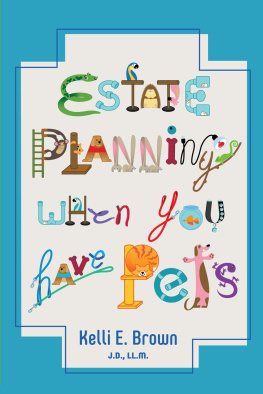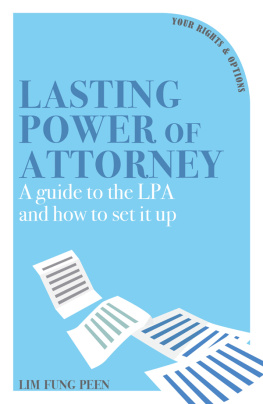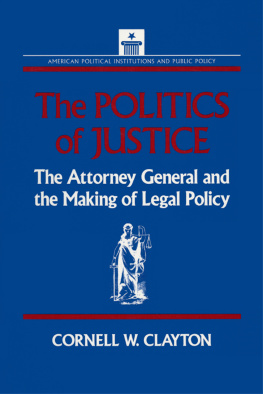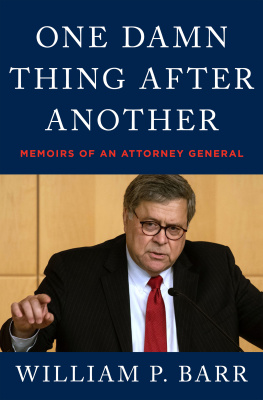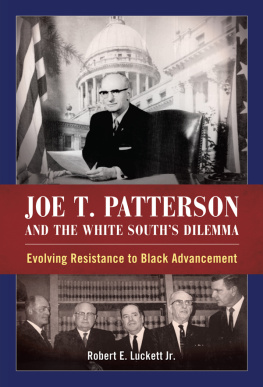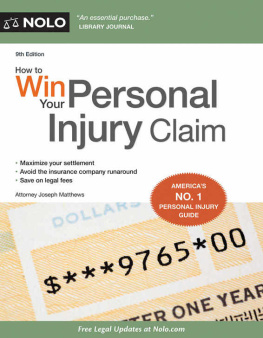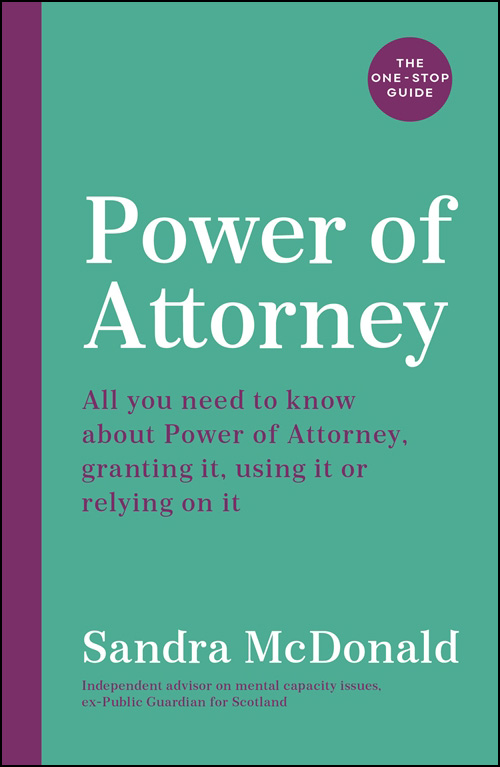Contents
Guide
Power of Attorney
THE ONE - STOP GUIDE
Power of Attorney
THE ONE - STOP GUIDE
All you need to know: granting it, using it or relying on it
Sandra McDonald

First published in Great Britain in 2021 by
Souvenir Press,
an imprint of Profile Books Ltd
29 Cloth Fair
London
EC1A 7JQ
www.profilebooks.co.uk
Copyright Sandra McDonald, 2021
10 9 8 7 6 5 4 3 2 1
Typeset in Dante by MacGuru Ltd
Printed and bound in Great Britain by
CPI Group (UK) Ltd, Croydon, CR0 4YY
The moral right of the author has been asserted.
All rights reserved. Without limiting the rights under copyright reserved above, no part of this publication may be reproduced, stored or introduced into a retrieval system, or transmitted, in any form or by any means (electronic, mechanical, photocopying, recording or otherwise), without the prior written permission of both the copyright owner and the publisher of this book.
A CIP catalogue record for this book is available from the British Library.
ISBN 978 1 78816 463 4
eISBN 978 1 78283 663 6

To the memory of my father, Steven Brian Leach
Introduction
For fourteen years I was the Public Guardian for Scotland. Its a title that has the ring of something with great power: I was once asked does it come with a cape?. And though it does not, the role is one that does come with great responsibility. This is because it is the Public Guardians job to support and supervise those who administer the affairs of people who are no longer able to do so themselves. Most people in this position have a Power of Attorney (PoA).
A PoA comes into play at a point in life that can be challenging for all involved. The document is one way of being legally authorised to manage the money and property, or health and welfare, of a person when they lose the mental ability to do so personally. The person themselves grants the PoA while they are still able, choosing someone, called an attorney, to whom they give that legal responsibility. When the time comes for a PoA to be enacted, whether through accident, old age or illness, there are so many factors involved that it is important to have support and guidance.
Acting as an attorney, especially for a loved one, can seem quite a natural thing to do so much so that the demands of the role are often overlooked. During my time as Public Guardian, working with others at the Office of the Public Guardian (OPG), I spoke with thousands of people acting as attorney. Very many of them would relay tales of woe. It was common to hear such comments as: No one told me this before, If Id have known what it involved I wouldnt have done it, Its not worth the paper its written on, No one takes any notice of my authority or I have rows with everyone. It was evident to me that being an attorney was not as simple as people assumed.
It was with some trepidation, therefore, that I agreed to be appointed as attorney to my own parents but you dont say no, do you? They supported you, so you do the same for them. Sadly, some years later my father went on to develop dementia. It didnt matter that I was the Public Guardian and worked regularly with families in this position; this was my dad, and I was suffering, just like any daughter, watching the deterioration of her beloved parent.
For the first few years of his illness my family supported Dad to make his own decisions, but as things progressed it became necessary to start acting formally using the PoA. Thank goodness he had had the foresight to do this.
After some months of acting as his attorney I became conscious that Id had none of the issues that, in my professional life, I was still hearing so many complaints about. I spent time considering why this was and concluded that it was because I was empowered: I knew what I could and couldnt do as attorney, what I was and was not entitled to, and how to assert my authority, to whom and when. For me the PoA was the efficient and powerful document that Dad had intended it to be. This started the drive I now have to put every attorney in that same empowered position.
I realised this empowerment came from having knowledge and being prepared, so I started to look at what information was available. There was (is) a lot of information, but it obviously wasnt working. Why not? I asked a number of people, from those acting as attorney to those thinking of granting a PoA, and their responses were consistent: Yes, there is a lot of information, but its too much, you dont know what applies to you and what doesnt. There is so much that its overwhelming and confusing, so you end up ignoring it. Rather than finding anything useful in the mass of information, someone told me that you learn by the school of hard knocks I found this so poignant that it has stayed with me.
So, if there is so much information out there that it creates confusion, why am I adding to it with this book? Well, I have deliberately gone for a comprehensive, one-stop guide that gives you all you need to know in one text and saves you having to trawl through the rest.
This book is not just for attorneys. You may have picked it up because youre thinking about making a PoA and are considering all the key questions, like whom do you give it to? What powers can you give, and when is the right time to assign them? The book will guide you through all the dilemmas. The range of ideas it offers will ensure that you grant a PoA which allows your attorney to use it as the effective document you want it to be.
A PoA is best done as a planned exercise. Too frequently I hear from relatives who tell me their loved one always intended to do a PoA but never got round to it. Things then become much more complicated; your loved ones, at what may well be the most traumatic time in their life, have to go to court to apply for the courts approval to manage things for you; this is emotionally testing, as well as financially burdensome, and comes with ongoing supervision and reporting. So if you are thinking of making a PoA, I can only urge you to do so as soon as possible this book will guide you through the process as well as the considerations.
The granting (making) of a PoA, and role of being an attorney, can come at one of the most stressful times of a persons life. There will be many other things you are also needing to think about; youll be juggling lots of other responsibilities at the same time.
You dont have to question whether I, as an independent advisor, have an angle, or think, She would say that, wouldnt she, because shes trying to get my business. This book gives an honest portrayal of what I have learnt, both as Public Guardian and personally as attorney to my father. It is not an academic text, but there will be some science bits: I have tried to explain the legal concepts you need to know in easy-to-understand terms. If you are thinking of granting a PoA, the book allows you to consider all of the relevant issues ahead and be fully informed; and if you are operating as an attorney, it aims to empower you to use the PoA as the effective document it should be. If I can get you to that position, then I will see it as the legacy of my career and some real positivity will have come out of my own personal experience as an attorney. I hope you find it valuable.


